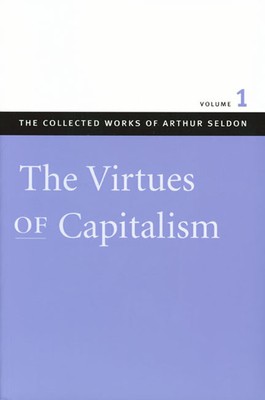
- We will send in 10–14 business days.
- Author: Arthur Seldon
- Publisher: Liberty Fund
- ISBN-10: 0865975426
- ISBN-13: 9780865975422
- Format: 16 x 23.6 x 4.1 cm, kieti viršeliai
- Language: English
- SAVE -10% with code: EXTRA
Reviews
Description
The Virtues of Capitalism lays the foundation of his views and theories of capitalism and its alternatives. The first part, Corrigible Capitalism; Incorrigible Socialism, was first published in 1980. It explains why, Seldon believes, "private enterprise is imperfect but redeemable," but the "state economy promises the earth, and ends in coercion to conceal its incurable failure."
The second part, Capitalism, is widely considered to be Seldon's finest work. Originally published in 1990 by Basil Blackwell of Oxford, it is the winner of the 1991 Antony Fisher Award from the Atlas Economic Research Foundation. This book covers a wide range of the classical liberal thought that inspired the movement toward free-market reforms in Great Britain and intellectually opposed the collectivist tide of socialism. In an understandable and eloquent manner, Seldon offers Capitalism as a celebration rather than a defense of classical liberalism. Through his analytical commentaries, Seldon chronicles the economic and social history of the western world throughout the 20th century, noting the intoxicating yet detrimental effects of collectivism. Along the way, he builds a powerfully compelling case why government should economically confine itself to the delivery of essential public goods. Throughout the book, he proposes free-market alternatives to socialist models of government, many of which still plague the economies of the world.
Arthur Seldon has been writing on classical liberal economics since the 1930s, when he was a student at the London School of Economics during Friedrich Hayek's time there. For over thirty years, from the late 1950s, he was Editorial Director of the London-based Institute of Economic Affairs, where his publishing program was one of the principal influences on governments all around the world, persuading them to liberalize their economies. His Collected Works in these seven volumes are a major contribution to classical liberal thought.
Colin Robinson was a business economist for eleven years. He was then appointed to the Chair of Economics at the University of Surrey, Guildford, United Kingdom, where he founded the Department of Economics and is now Emeritus Professor. He is the author of 23 books and over 150 scholarly articles and has edited many other books. For many years he has been associated with the Institute of Economic Affairs and from 1992 to 2002 he was the IEA's Editorial Director.
EXTRA 10 % discount with code: EXTRA
The promotion ends in 21d.23:14:18
The discount code is valid when purchasing from 10 €. Discounts do not stack.
- Author: Arthur Seldon
- Publisher: Liberty Fund
- ISBN-10: 0865975426
- ISBN-13: 9780865975422
- Format: 16 x 23.6 x 4.1 cm, kieti viršeliai
- Language: English English
The Virtues of Capitalism lays the foundation of his views and theories of capitalism and its alternatives. The first part, Corrigible Capitalism; Incorrigible Socialism, was first published in 1980. It explains why, Seldon believes, "private enterprise is imperfect but redeemable," but the "state economy promises the earth, and ends in coercion to conceal its incurable failure."
The second part, Capitalism, is widely considered to be Seldon's finest work. Originally published in 1990 by Basil Blackwell of Oxford, it is the winner of the 1991 Antony Fisher Award from the Atlas Economic Research Foundation. This book covers a wide range of the classical liberal thought that inspired the movement toward free-market reforms in Great Britain and intellectually opposed the collectivist tide of socialism. In an understandable and eloquent manner, Seldon offers Capitalism as a celebration rather than a defense of classical liberalism. Through his analytical commentaries, Seldon chronicles the economic and social history of the western world throughout the 20th century, noting the intoxicating yet detrimental effects of collectivism. Along the way, he builds a powerfully compelling case why government should economically confine itself to the delivery of essential public goods. Throughout the book, he proposes free-market alternatives to socialist models of government, many of which still plague the economies of the world.
Arthur Seldon has been writing on classical liberal economics since the 1930s, when he was a student at the London School of Economics during Friedrich Hayek's time there. For over thirty years, from the late 1950s, he was Editorial Director of the London-based Institute of Economic Affairs, where his publishing program was one of the principal influences on governments all around the world, persuading them to liberalize their economies. His Collected Works in these seven volumes are a major contribution to classical liberal thought.
Colin Robinson was a business economist for eleven years. He was then appointed to the Chair of Economics at the University of Surrey, Guildford, United Kingdom, where he founded the Department of Economics and is now Emeritus Professor. He is the author of 23 books and over 150 scholarly articles and has edited many other books. For many years he has been associated with the Institute of Economic Affairs and from 1992 to 2002 he was the IEA's Editorial Director.


Reviews